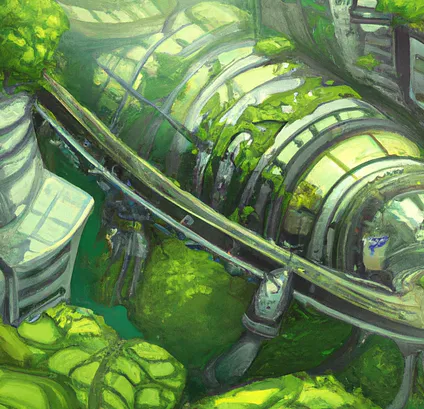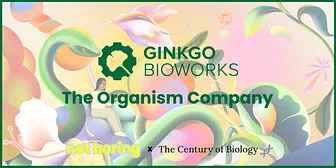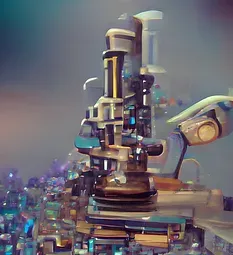Welcome to The Century of Biology! Each week, I post a highlight of a cutting-edge bioRxiv preprint, an essay about biotech, or an analysis of an exciting new startup. You can subscribe for free to have the next post delivered to your inbox:
Normally, I focus on what is happening: a biotech revolution. I also focus on how scientists and engineers in this space are building the future. Today, I try to address why in my view it is a moral and aesthetic imperative to pursue biotechnology.
Enjoy!
Today’s post is brought to you by the first ever COB sponsor… Cromatic
The biotech industry is evolving. Launching a new startup has become less capital intensive. A new generation of founders are building nimble teams, and outsourcing portions of their R&D to stay lean and focus on core scientific competencies.
Outsourcing can come with headaches. It can be challenging to decide on the right vendor, compare prices, and track project progress. While contract research organizations (CROs) are an important part of the modern biotech ecosystem, these partnerships come at a cost.
Cromatic is on a mission to help modern biotechs make the most out of outsourcing. Their vision is to develop the infrastructure necessary to make contract management a painless, daresay enjoyable, experience. Cromatic makes outsourcing easier than ever so you can focus on the science.
Cromatic is currently performing outsourcing searches for early stage biotech companies for free. Learn more here.
Our culture has developed a fundamental skepticism about growth. Many doubt whether growth is possible from within our Leviathan institutions that don’t seem capable of rapid progress. Skeptics of capitalism doubt that we can grow in a way that is fair or sustainable. With climate change looming, it has become surprisingly common to question the morality of having children.
Contrary to this ethos, technologists dream big.
In her cogent argument for American Seriousness, the investor Katherine Boyle makes the case for a renewed focus on building. Housing. Trade schools. Factories. Infrastructure. A return to American progress where "building is a political philosophy. It is neither red nor blue, progressive nor conservative. It is averse to the political short-termism and zero-sum thinking that permeates our aging institutions that won’t protect us in this era."
In similar fashion, Packy McCormick has proposed a commitment to optimism, and the belief that we have the agency and capability to collectively build the future that we want. Part of what made Silicon Valley great was a receptiveness to this type of philosophy.
Sam Altman, who is the CEO of OpenAI and was formerly the president of Y Combinator, has also shared his personal mission statement. For Sam, it all boils down to the following three goals:
Help create abundance by driving the cost of intelligence and energy as low as possible; optimize distribution of resources.
Enable talented people; increase collective ambition, optimism, drive for excellence, moral progress, scientific progress, standard of living, and happiness; lengthen time horizons.
Continuously expand our understanding of the nature of the universe; preserve and expand consciousness; make the best use of the resources in the universe for all sentient life.
These goals stretch human ambition to the cosmic scale. To make progress, Sam considers building Artificial General Intelligence (AGI) to be the "most interesting, challenging, and important technical problem in the world" which is why he co-founded OpenAI. Here, AGI is discussed in practically Godlike terms, as the invention of all inventions. With limitless intelligence, all other scientific and technological problems are solvable.
While this all may sound abstract, AI absolutism is not a fringe view among technologists. I have met several engineers who’ve expressed that they have felt that their current projects were pointless. If AGI is going to solve everything, why work on anything else? Do our small wet brains even matter if we are on the verge of disembodied digital intelligence, or consciousness?
For me, this worldview has clarified two points. First, it is a valuable exercise to concretely think about the impact that you want to have, and the type of future that you want to help build. Second, I have realized that as a biotechnologist I am interested in a different kind of growth than AGI scientists or other digital technologists.
I want to share my own personal mission statement: I want life to flourish in the universe. I view biotechnology as the most logical means towards this end.
When I say life, I mean the process that has carpeted our planet in cells, flowers, and children. Life is an abundant, beautiful, generative process. I’m talking about viriditas. The "constant pressure, pushing toward pattern. A tendency in matter to evolve into ever more complex forms. It's a kind of pattern gravity, a holy greening power we call viriditas, and it is the driving force in the cosmos. Life, you see."
More broadly, I’m arguing for the beautiful imperfections of carbon-based corporeal life in all of its various forms. I want biological life to flourish on our home planet, and I want life to spread outwards into the Cosmos. I want more bugs, babies, forests, and trees in the universe. I’m arguing against the future in which "substrate independence" lets us fill the world with digital minds. I’m making an aesthetic argument for substrate preference: a deep desire to propagate carbon-based life.
Perhaps it is myopic, but there is something special about biological life. About the prospect of more green, wet planets in the universe. The chaos and complexity of evolved cellular machinery. I’m arguing that if AGI is a rocket ship with any chance of launching sentient life into the Cosmos, something deeply important and beautiful would be missing if it weren’t launching biological organisms.
Accepting this goal as a fundamental axiom clarifies the centrality of biotechnology. Biology is the only functional nanotechnology that we know of. Life has evolved sophisticated machinery to thrive in every corner of the globe. These programmable machines are capable of converting matter into arbitrary structures with atomic precision. Building such systems is completely outside the scope of our current technological capacity. Thankfully, we don’t need to. Our most advanced biotechnologies like CRISPR gene editing are discovered, not invented.
In this respect, our job as biotechnologists is to do the careful science, engineering, refactoring, and refining necessary to realize the full generative potential of Natural systems. The goal is to use all of the tools at our disposal to harness universal life machines—cells.
I’m talking about worshiping Growth—in the biological sense. Growing trees, the living systems that pull CO2 out of the atmosphere while turning sunlight and water into beautiful three dimensional structures that carpet large portions of our planet. Growing food using the awesome power of microbes in a way that could sustainably feed the entire planet. Growing our medicines—advanced nucleic acid, cell-based, and microbial therapies that enable us to live healthier and longer lives. Growing materials to build advanced cities with abundant housing.
Tapping into the awesome power of biological growth has the potential to unleash profound physical abundance and economic growth.
If we develop "new forms of engagement with life and living systems" it is hard to imagine the ceiling for what may be possible. We could grow a world without scarcity. In this view, the universe has a nearly infinite carrying capacity for living systems. It is up to us to tap into the full biotic potential on our planet, and to expand it outwards.
As a computational biologist, I have a deep appreciation for the beauty and utility of universal Turing machines and the promise of artificial intelligence, especially as a description language for complex biological systems. My argument is not against the world of bits—there is immense potential in continuing to blur the two worlds—it is for a renewed emphasis on the wonders of having a biological body, and of being embedded in a biosphere with enough latent manufacturing capacity to meet the needs of all living things many times over.
I’m calling for a transition away from the view that we are simply "survival machines—robot vehicles blindly programmed to preserve the selfish molecules known as genes" and that our biological basis is something to escape as rational beings. There is tremendous potential if we can learn to realign ourselves with our genes and our environment. We can move from a world of scarcity and doubt about our children’s future into one where our cells, bodies, and planetary societies are in alignment. In this future, our children and their biosphere will embrace Viriditas and continue outward to make more corners of the Cosmos green.
Thanks for reading this week’s essay about Viriditas: why growing more is good. If you don’t want to miss the next preprint highlight, biotech essay, or startup analysis, you can subscribe to have it delivered to your inbox for free:
Until next time!
"I’m calling for a transition away from the view that we are simply *survival machines—robot vehicles blindly programmed to preserve the selfish molecules known as genes*" Well-said. The related threads to this is often underexplored in society - what are our other base instincts beyond survival? I think of self-expression as another natural and powerful instinct and it seems to play a more important role in feelings similar to this. I see so much overlap in which this natural desire for "self-expression" coincides with a world that is greener, wetter, and is fundamentally rooted in biological life. I think it's something about the natural chaos or serendipity that complex bio-systems can provide that seems to encourage and facilitate this losse "self-expressive" parts of ourself. Wish there was more research on the subject! |
Excellent post. There is so much potential will the combined impact of increased computing power, lower energy costs and improvements in biological sciences. Do you have any thoughts on how the current funding structure of our institutions helps/inhibits work towards your stated goals? Do you see any significant blocks or inflection points that philanthropies or other groups should be funding beyond the typical funding mechanisms? |







 Publish on Substack
Publish on Substack